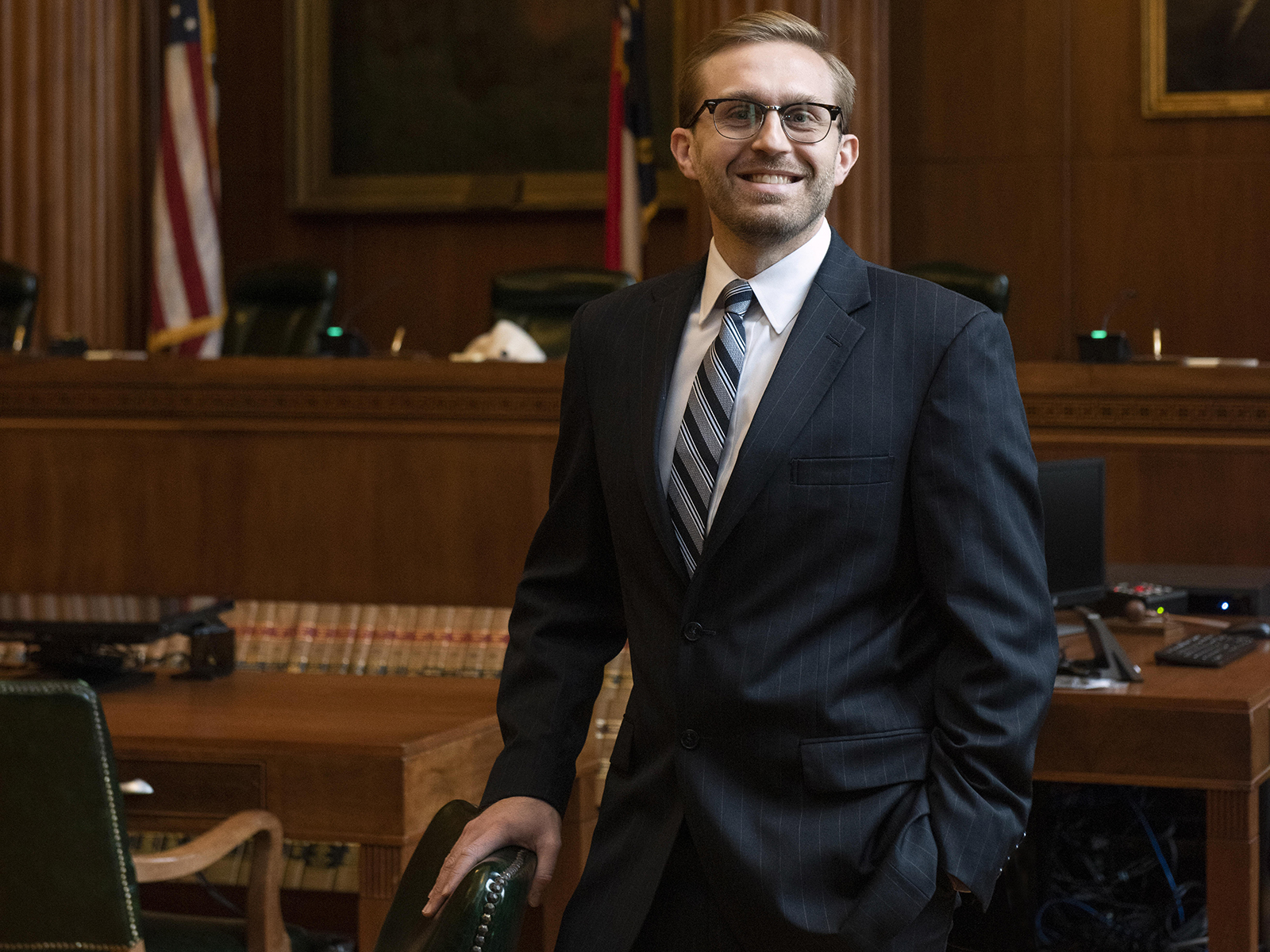Grant Buckner L’13 leads a small team at the Supreme Court of North Carolina that crafts rules, reviews opinions, and provides counsel for the state’s highest court.
This story first appeared in the Winter 2020 edition of the Elon Law Alumni News Bulletin.
As almost every lawyer knows, in every court, at every level of government, there are particular rules and practices that judges expect attorneys to follow.
There are dockets to be organized. There are staffers to be trained and managed. There are behind-the-bench mechanizations crucial to the administration of justice. And that is where Elon Law alum Grant Buckner L’13 has found a calling with the Supreme Court of North Carolina.
Buckner oversees a small team of lawyers who bring order to a court celebrating its 200th anniversary. The collective responsibilities of his relatively new office fall into five broad areas: rulemaking, opinion review, docket management, institutional training, and general counsel.
The Supreme Court is responsible for more than a dozen rule sets, from the Rules of Appellate Procedure to the Code of Judicial Conduct to the Rules of Mediation for Farm Nuisance Disputes. If a rule amendment is needed, Buckner’s team in the Office of Administrative Counsel will study the issue and draft proposed language.
“Procedure matters, and rules of procedure need to be clear so that people know how to interact with the courts,” he said. “Being able to write rules that are plain, clear, and usable promotes the administration of justice in our state. And there has been so much room for improvement in this area that we have seen a great deal of progress in a very short period of time.”
The team also reviews every opinion before it is issued by the Supreme Court and offers editorial advice to the authoring justice to ensure that the opinion is clear, consistent, and supported with accurate citations. One of the team’s newest duties is helping to manage a court docket that has doubled in size within the past year. A state law that took effect in 2019 requires all cases involving the termination of parental rights to be appealed directly to the Supreme Court.

Then there is the training that Buckner’s office provides new court employees, as well as counsel offered to the Supreme Court when interacting with the state’s Administrative Office of the Courts. Since justices come and go with elections and mandatory retirements, and law clerks do the same, Buckner likens his team to the keeper of the Supreme Court’s institutional memory.
North Carolina’s top jurist has nothing but praise for Buckner and his team’s contributions to the Supreme Court. “Grant has been an invaluable advisor for the court and we appreciate his dedication and hard work. He and his team do so much for us,” said Chief Justice Cheri L. Beasley of the Supreme Court of North Carolina. “They make sure that every opinion has been proofread and cite-checked and, with his leadership, we are updating the many rule sets that our court is responsible for and improving access to the courts by making them available online.”
Buckner, 35, has strong Greensboro roots. He grew up in the southern part of the city, earned a degree in psychology from UNC Greensboro, and started his professional career at the Center for Creative Leadership, a global leadership development company headquartered in Greensboro.
At the Center for Creative Leadership, he discovered a passion for learning about how procedures and processes affect the way individuals interact with institutions. That led him to a master’s program in industrial-organizational psychology at Appalachian State University and then to Elon Law.
He was hired out of Elon Law to clerk for the Hon. Robert N. Hunter Jr. at the North Carolina Court of Appeals. What caught Hunter’s attention was Buckner’s educational background in industrial-organizational psychology.
“I’m one of those people who believes that structural changes are more important than individual personnel changes and a behavioral psychologist watches how people respond in systems,” Hunter said. “He’s a very charming person who takes his work very seriously, but he can do it with a sense of humor that people find appealing. He has a good sense of irony, and that gets you through a lot of bureaucracy and serves you well in a government position.”
Buckner so impressed Hunter, and then-Chief Justice Mark Martin, that Martin recruited Buckner to clerk for him and then stay in Raleigh to build Buckner’s current office over the course of a three-year pilot program. At the end of that three-year pilot phase, the Supreme Court named Buckner its Administrative Counsel and formally established the office that Buckner now leads.
Buckner lives today with his wife, a teacher, and two young daughters in Cary, where he also serves as an elder in his local Presbyterian church.
Buckner said his greatest professional thrill is making an impact on systems that benefit all people. “I am able to make a tremendous impact because there simply hasn’t been a position like mine in the past,” he said. “The court has entrusted me with a lot of responsibility, and I carry the weight of that responsibility in everything that I do.”



